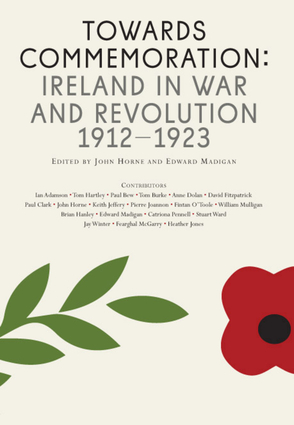Overview
This book arrives on foot of a decade of commemorations. Contemporary Ireland was founded during the fractious years 1912-1923. From the signing of the Ulster Unionists’ Solemn League and Covenant to the partitioning of the country and subsequent Civil War in the Irish Free State, a series of events shaped Ireland for the century to come. Not least of these was World War I. This volume, edited by John Horne, features essays by leading historians, journalists, civic activists and folklorists. The outstanding body of scholarship offers an array of new views in the incendiary debate on how to remember a divided past. The book is organised into three sections: histories, memories and commemorations. The first section picks through the backgrounds of war and violence in the European and Irish revolutionary contexts. In the second section personal histories drawn from community and family memories are told. The third section contains the most heated contributions on the dangers and opportunities of commemorations. This collection is framed around a ten year period, yet it takes the reader towards a richer understanding whole of the twentieth century, allowing for an open and creative engagement with the past of war and revolution.Author Biography
John Horne is Professor of Modern European History at Trinity College Dublin and a Member of the Royal Irish Academy. He is an executive member of the Research Centre of the Historial de la Grande Guerre, Péronne and has published widely on 20th century France and the comparative history of the First World War.Edward Madigan is the Resident Historian at the Commonwealth War Graves Commission and a visiting fellow to the Changing Character of War Programme at the University of Oxford. His work combines military, cultural and religious history and his main research interests are British faith and identity in wartime, and the British and Irish experience and memory of the Great War.Paul Bew received his doctorate at the University of Cambridge and has been Professor of Politics at Queen’s University Belfast since 1991. He is a cross-bench peer serving on the London Local Authority Bill Select Committee and acts as secretary to the All Party Group on Archives. He is also an honorary Fellow of Pembroke College, Cambridge, and Member of Royal Irish Academy.Fintan O'Toole is a columnist and literary editor with The Irish Times and Leonard L. Milberg lecturer in Irish Letters at Princeton University. He has written books on Irish history, politics, society and culture. He has been awarded the European Press Prize 2017 and the Orwell Prize for Journalism 2017.William Mulligan is a lecturer in modern European history at University College Dublin. He has written The Origins of the First World War (Cambridge, 2010) and The Creation of the Modern German Army (2005).Anne Dolan lectures in modern Irish history at Trinity College Dublin. She is currently working on a study of violence and killing in Ireland in the decade of the Great War.Catriona Pennell graduated from Trinity College, Dublin in 2008 with a PhD in modern British and Irish history. Since 2009 she has been a lecturer at the University of Exeter's Cornwall Campus. She is currently working on various aspects of Ireland's experiences in the First World War, including a reassessment of the 1918 Conscription Crisis.Ian Adamson, OBE, is a retired community paediatrician and well known in Northern Ireland for his political, civic and cultural work. He is founder Chair of The Ulster-Scots Language Society, a leading figure in the modern revival of Ulster-Scots and has published widely on Ulster history, language and culture.Keith Jeffery is Professor of British History at Queen’s University Belfast and a Member of the Royal Irish Academy. He is author or editor of fourteen books, including Ireland and the Great War, The GPO and the Easter Rising, and a prize-winning biography of Field Marshal Sir Henry Wilson.Heather Jones is Lecturer in International History at the London School of Economics and Political Science. She is a graduate of Trinity College Dublin where she was a foundation scholar and St John's College, Cambridge. Dr Jones is a former IRCHSS Lecturer in European History at Trinity College, Dublin and has held a Max Weber Fellowship at the European University Institute, Florence. She is a member of the Board of Directors of the Historial de la Grande Guerre, Péronne.Jay Winter teaches history at Yale University. He is editor-in-chief of the three-volume Cambridge History of the First World War, to be published in 2014.Tom Burke, MBE, is a founding member of The Royal Dublin Fusiliers Association. In August 2004, he was awarded an Honorary M.B.E for his contribution to the British-Irish peace process. He has acted as a guide/adviser to President McAleese on her visits to Wytschaete, Belgium, in June 2007 and Gallipoli in March 2010.Tom Hartley has been active in politics for 42 years and was first elected to represent the Lower Falls on Belfast City Council in May 1993. In 2008 he became the second Sinn Féin Lord Mayor of Belfast. Since 1998, Tom has combined his love of history and interest in the environment by organising historical walks through the Belfast City Cemetery

